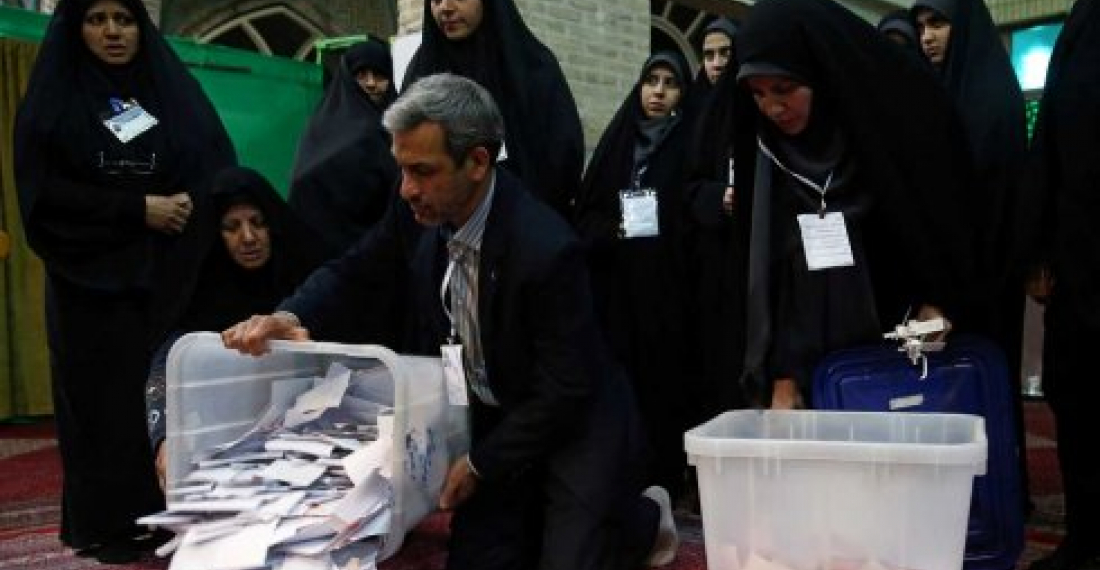Benyamin Poghosyan assess parliamentary elections in Iran held amid a coronavirus crisis and constant pressure from the US, in this op-ed for commonspace.eu
On February 21, 2020 Iranians went to polling stations to elect their new parliament. Despite all the statements of Iran's leadership, including Supreme Leader Khameni, of the importance of a high turnout, only 42 percent of registered voters cast their ballots, the lowest figure since the 1979 Islamic Revolution. Many inside and outside Iran see the low turnout as a tacit protest of a large part of the electorate against the Guardian Council's decision to cancel the registration of many moderate and reformist candidates. Supreme Leader blamed the low turnout on the "negative propaganda" about the new coronavirus by Iran's enemies. The final election results, announced by the Interior Ministry, showed big gains by hard-line conservatives. In Tehran, a list of conservatives gained 30 seats from the capital.
Since late 2017 Iran has entered a permanent state of instability, with occasional large scale protests, followed by almost daily small demonstrations. The most recent upsurge of protests was in November 2019 as a response to the petroleum price hike. The killing of General Soleimani by the US drone strike seemingly united Iranians in their defiance against their archenemy, but the accidental shoot down of the Ukrainian passenger jet by the Iranian air defense forces, and subsequent attempts to hide the truth, boosted anti-government sentiments. Given the sharp decline of the Iranian economy due to the re-imposed US sanctions after President Trump decision to withdraw from the 2015 Iran nuclear deal, some Western experts believe that the "maximum pressure" campaign against Tehran has started to bring results. According to this mindset Iran is in a viscous circle of protests, government's tough reaction, and stronger protests as a response. Thus, according to this thesis, Iran has only two options - to renegotiate the 2015 nuclear deal and accept all American demands, or prepare to face the collapse of the state.
However, this logic has some weak points. The ongoing protests are not a novelty for Iran. The country has witnessed many anti-government protest movements, among them the large youth protests in 1999 and the 'Green movement" in 2009, which were a much more serious challenge for the ruling elite. Yet both failed to bring about significant changes. The current economic situation in Iran is tough, but we have to take into account that since 1979 Iran has developed a "Resistance economy" and despite all Western and international sanctions and isolation was quite successful in establishing a modern defense industry and other branches of high tech economy.
Another problem in these predictions of Iran's inevitable collapse is the lack of understanding of what this may entail. Obviously, Iran is neither Libya nor Yemen and any state disintegration will result in catastrophic ramifications for the entire Middle East. In a worst case scenario several de facto entities based on ethnic identity may emerge, including Balochistan and Iranian Kurdistan. Up to 20 million Turkish speaking population of Northern Iran also may think about creating its own state entity, though currently this part of population is well integrated into the Iranian state. Meanwhile, possible establishment of Iranian Balochistan definitely will trigger instability in Balochistan province of Pakistan and Iranian Kurds will complicate the situation in both Kurdistan Regional Government in Iraq and Northeastern Syria controlled by Kurds led Syrian democratic forces. Creation of any new Turkish speaking state entity along the borders of Azerbaijan, Nagorno Karabakh and Armenia will have unpredictable implications for the security dynamics of the South Caucasus. One thing is clear, state collapse in Iran will not result in establishment of the new Iranian Republic based on the liberal democratic institutions and values, but will make Middle East even more messy, chaotic and dangerous place. Given the well-developed defense industry, including production of mid and long range (up to 2000 km) ballistic missiles, state collapse in Iran may result in missile technology proliferation which will threaten all Middle Eastern states.
Thus, all experts claiming the inevitability of a quick regime change in Iran do not take into account the history of the Islamic Republic and fail to assess the potential devastating implications of such development for the entire Middle East. Yes, Iran is facing tough times, and there is a growing resentment among the middle income parts of society, but Iran is still far from collapse and the state leadership maintains a strong influence over large parts of the low income population, which is also the part of society most susceptible to manipulation by the religious establishment.
Meanwhile, the conservatives' victory in the 2020 Parliamentary elections most probably will have significant influence in the upcoming 2021 Presidential elections. Moderate camp leader incumbent President Rouhani can not run again due to the term limits. Given the latest victory the hardliners are better positioned to support their own candidate for the 2021 Presidential elections. Iran thus faces the prospect that in 2021 conservatives have control over both the legislative and executive branches of the Iranian government. If President Trump is reelected in November 2020, we may face the growing tensions in US - Iran relations in 2021-2024. It's unlikely that President Trump will abandon his "maximum pressure" campaign; simultaneously Iran under the total control of conservatives will neither collapse nor accept American demands. In this state of affairs the two states may come dangerously close to direct military confrontation. It is the task of the international community to prevent such an outcome, as it will have truly catastrophic ramifications for the Middle East and beyond.
source: Benyamin Poghosyan is the Founder and Chairman of the Center for Political and Economic Strategic Studies in Yerevan.
photo: Parliamentary elections were held in Iran on 21 February 2020.
The views expressed in opinion pieces and commentaries do not necessarily reflect the position of commonspace.eu or its partners







